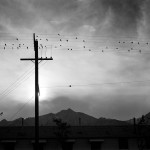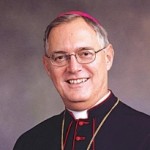
Archbishop Timothy Dolan got a stand ovation in the middle of mass, this weekend, for his passionate defense of Pope Benedict XVI against what seems to be a concerted effort to undo his papacy, via distortion and a media rushing-to-judge.
I have linked to John Allen’s last several pieces on the “Benedict story” and urge that those who have not already made up your minds to read them and also take a gander at Fr. Raymond de Souza’s spirited defense and timeline.
The timeline is important. As Allen suggests, it is necessary to keep the records straight in a story that can easily confused Catholics and non-Catholics alike.
It is heartening that in email and my conversations with others, I have had Jewish and Protestant correspondents write, “I am praying for the pope.” They see him as being unfairly targeted and tainted. Even a few atheists have expressed the opinion that the case against Benedict seems “thin” and “willful,” or -as one agnostic fellow wrote- “unconvincing and forced.” Indeed, when the “Munich” story proved to have no legs, the “Wisconsin” story was quickly headlined. As de Souza notes:
A demonstration took place in Rome on Friday, coinciding with the publication of the New York Times story. One might ask how American activists would happen to be in Rome distributing the very documents referred to that day in the New York Times. The appearance here is one of a coordinated campaign, rather than disinterested reporting.
Pope Benedict has taken ownership and control over a heavy burden that his predecessor was too ill to manage. As detailed in this piece by John Allen, Benedict’s time-lapsed clarity on this issue has inspired him to do passionate and profound work, in order to bring the church to repentance for these sins. I’ll never forget one of his earliest speeches as pope, when he vowed to rid the church if “the filth.” He has taken resignations from bishops, presided over substantial and enforced reforms and has personally met and ministered to the victims, who need not only validation, not only justice, but also the healing ministry of a shepherd who loves his flock.
Will the good Benedict has wrought be overshadowed by a focus and an effort that, as Cristian Odone writes, entices some with the notion that the big scalp of a pope may soon be a souvenir?
It is ironic that the same people who -quite rightly- demand justice for the victims of sexual abuse seem so determinedly fixated on a scandal that has been and (thankfully) continues to be addressed by this pope, while casting a blind eye toward abuse cases which are not being addressed at all, by anyone.
You would think people would care about all victims of sexual abuse, not just the ones whose victimhoods help propel a narrative or expedite a “desired” outcome, wouldn’t you? Occasional stories like these tend to seem more irked by the waste of taxpayer money, than the abuse of students.
A few people have written me scathing letters charging me with not writing much about these scandals because I am (as one wrote) “a brain-washed moron” who will obediently “protect the church, instead of the children.”
Had that person read me with any regularity, she would know that I studiously avoid all stories involving the sexual abuse of children. Some dark places are too familiar, and I prefer avoid them when I can. In this case, I’ve kept my thoughts mostly to myself.
But, I must say, sometimes, when I think back on how things played out in my own life, I wonder if some of the church’s failed response mechanisms were simply a case of institutional psychological denial. I’m not looking to excuse anyone, only to understand. But the church is made up of humans involved in a complicated love. In some families, like mine, clues and whispers and behavioral problems that should have made things clear simply did not register as they should have. Until someone finally opened her mouth and said things outright (that would have been me) issues were ducked or ignored. Everyone became very good at pretending that everything was all right. Why? Because of fear. Because of ignorance and feelings of helplessness and confusion. Because, in an odd way, of love.
In my family’s case, when I finally made my noise, two things happened: some accused me of either lying or “being mean.” Others finally woke up and moved quickly from their state of denial into righteous anger.
Those who had “woken up” and then supported me did the right thing; I did not love them less because of their initial blindness, or because they had to first move from denial to acceptance. Victimhood tends to help one understand how frail our humanity really is, sometimes, and those insights give room for a bit of mercy.
Ross Douthat writes:
In reality, the scandal implicates left and right alike. The permissive sexual culture that prevailed everywhere, seminaries included, during the silly season of the ’70s deserves a share of the blame, as does that era’s overemphasis on therapy. (Again and again, bishops relied on psychiatrists rather than common sense in deciding how to handle abusive clerics.) But it was the church’s conservative instincts — the insistence on institutional loyalty, obedience and the absolute authority of clerics — that allowed the abuse to spread unpunished.
How and why could such sustained inertia and secrecy prevail? Fr. James Martin gives us an idea and I urge you to read his whole piece.
I covered a little of what Fr. Martin covers in a recent email exchange with a young man who sent a brusque and angry missive:
I can’t help but think of how Catholics are the true Christians and wonder if the words and actions of the Catholic church imply that there’s no true Christian faith at all.
That was staggeringly painful to read; I have known this young man since he was kneehigh. I responded, admitting that I had not yet processed the stories fully (indeed, we are processing every day, it seems), but here are a few thoughts I shared with him:
You are smart enough to know that this is no light issue for people like me, so please don’t think we’re not as angry or disgusted as you are…These abuses of trust and power are evil.
This is not excuse-making, but pertinent history] in the 1970’s and 1980’s pedophiles and pederasts were thought to be “treatable” and “curable” with psychotherapy; that was the recommendation made by psychiatric experts at the time: “get them therapy and reassign them.” It was bad advice, particularly in light of more recent studies about the recidivism of abusers of all stripes; by my lights, the bishops who took it failed in spiritual wisdom; regardless of what the “experts” told them, they should have understood that any priest capable this abuse (or this “sick” as the experts classified them), was spiritually sick as well, and unfit to perform his office in a parish setting. This is a terrible, terrible disgrace and any Catholic who does not see this is willfully ignorant.
But unfortunately…those responses were reflective of the times in which we lived. In earlier decades, many of the sorts of criminal charges specific to child sexual abuse, which are common and enforced now, were not even on the law books – rather than abuse being criminalized, these crimes (when they involved molestation and not out-and-out rape) were looked at as a “treatable illnesses.” It will seem strange to you, but when I was growing up, it was considered perfectly within a parent’s right to beat a child, and the sexual abuse of children (by parents and siblings) that was rampant in my era (and on my block) was something that was rarely thought of as “criminal;” it was also simply “not talked about.” Things were hushed, and children were violated, victimized and convinced that they’d brought it all on themselves.
Sometimes parents were also culpable with these coverups. I have a friend who, as a little girl, was grabbed by a priest and “hugged” in a way that made her frightened and uncomfortable enough to tell her mother about it. The mother smacked her for daring to imply anything about the priest. Other parents, rather than exposing the priests and supporting their children, took money and shut up. This is a vile, poisonous infection that must be repeatedly drained, and for us Catholics, it is a monstrous reality for which we (and the whole church) must do penance.
Believe we are doing penance.
The good news -relatively speaking- is that most of these reports are decades-old and the zero-tolerance safeguards that have been put in place are being enforced rigorously. … The bad news is that -among all of these real reports- there will be some fake ones with good priests slandered (like Cardinal Joseph Bernadin, some years back) by direct accusations that are untrue. Literally all of our priests, however faithful, carry this stain and face the jeering and distrust, because of what some priests have done, and how the hierarchy handled it. [A family member] who is a very good priest, has taken to not wearing his robes when he is not working, because he got tired of the smart-ass “out trolling for boys, Father?” remarks he had to endure every day. How terrible for them, too.
All of this is a little analogous to Abu Ghraib. Because of the behavior of a distinct minority of soldiers, our whole armed forces were tarnished. Also, we see that in the NYC Public School system, the sexual abuse of students is approximately 500 times more prevalent than it is within the church, which -were that widely known- would sully the reputations of countless fine teachers.
This business with the church, of course, is much worse, because it involves spiritual and moral authority.
These are very deep and supernatural issues, and to really delve into them, and come away with any sort of (I hesitate to use the word “wisdom” for seeming to think too much of myself- but perhaps “understanding” is the inadequate word I want) one has to bring at least a willingness to attempt open-mindedness – first to acknowledge that there are things natural and supernatural, and then to spend the time discovering how supernaturalism plays out and transcends everything we know or think we know.
Where there is great holiness, there is also –always– evil at work. This is true in every single soul; it is true in every church. It is particularly true for the church which has the sacramental and physical presence of Christ within its keeping. It is dark and light, always at odds, and the church has always been the epicenter of the battle. When Jesus said to Peter, “I give you the keys to the kingdom; you are Peter, and upon this rock I will build my church, and the gates of hell shall not prevail against it,” he was acknowledging, even then, that this was an institution that was going to shake and be roiled and do battle, throughout time.
The fact that he put Peter – a passionate but very flawed man- in charge of it also demonstrates that from its inception, the church would be placed in the hands of flawed humans who were not always going to live up to their roles. Peter, remember, denied Christ to the crowd, even after he had said to Jesus, “you are the messiah.” Just as Jesus -who is All Good- was crucified in the midst of thieves and murderers, evil and good exist side-by-side.
The church itself is a flawed institution that exists solely by the grace of the Holy Spirit. Left to the mere machinations (and incredible sinfulness) of some of the men who have run it, it would have died long ago.
I am not ready to indict Ratzinger on the basis of some very dubious reportage. If you had read any of his writings -as I have extensively- you’d realize that he is a staggeringly brilliant, insightful and humbly holy man who has, for me, anyway, earned the benefit of a doubt.
I say that mindful of what I have written about holiness and evil existing side-by-side, which means I know I must remain alert.
None of this is to say you are wrong to be disgusted and appalled. You would be a stupid person if you were not, and all of us would be plain foolish if we did not have doubts. But as a Christian who has worked at it, and has experienced both the “dark nights” of doubts and emptiness and the “milk and honey” moments, I know that there is a foundation of reality in the Word and the Eucharist, and I know too that the church -for all of its flaws and failings- has also done some incredible, good, things for the life of the world.
The dark and light again; it has been part of the church from its very first moments; they will intersect, and do battle, until the end. It is one of the things that makes the whole faith journey at once so exciting and so mysterious, so uplifting and terrifying, so maddening and so quietening. It is very difficult to look past the broken creatures and focus on the Creator, but that is what faith calls me to do. And the evil would like nothing better than for me to only see the creatures, and be so appalled by them (by myself, too) that I look no further. But that is precisely why I must look further.
Speaking as a woman who is a survivor of sex abuse in the home and elsewhere, what I know and have observed is this: sexual abuse of children is about power and immaturity, and it exists everywhere human beings exist -in the homes, in the schools, in the youth organizations, at the Yeshiva, in the workplace and the colleges.
Of course it will exist in the churches as well; there are human beings in the churches. That the humans administering within the church made hellaciously bad decisions about how to address this is going to be a fault that reverberates (like tectonic plates shifting in its depths) for generations. Healing will be very slow; for some -and this is the most tragic thing- it will never come. I would not want to be any of these priests, bishops and perhaps even popes who will have to answer to God as to why they did not protect their flock better, and rid the corral of rabid wolves, why they allowed so many to suffer -and so many more to fall away- and thus be prevented from experiencing the sweetness and consolation that can come of a relationship with God.
I know this is very long. If you’ve read this far, thanks for hanging in. I expect you KNOW that I have only scratched a surface here, that there is a good deal more to be said -challenges to the heart, the spirit and the intellect. But it’s the best I can do for now. As I said, I too am still processing this.
Finally, there is this:
“To be connected with the church is to be associated with scoundrels, warmongers, fakes, child-molesters, murderers, adulterers and hypocrites of every description.
It also, at the same time, identifies you with saints and the finest persons of heroic soul of every time, country, race, and gender.
To be a member of the church is to carry the mantle of both the worst sin and the finest heroism of soul because the church always looks exactly as it looked at the original crucifixion, God hung among thieves.”
— — Fr. Ronald Rolheiser, O.M.I., “The Holy Longing”
Related:
“Scoundrel Times”
“There is no better time for repentance”
Is this “settling a score”?
Is Benedict a Reactionary or a Prophet?
Inside Catholic looks at “historical revisionism”
“The Pope is Taking Strong Action”
Dare to Discipline
“False and Slanderous” charge against the pope
“Smoking Gun?”
Culture Change in the Church
It is Holy Week, after all











